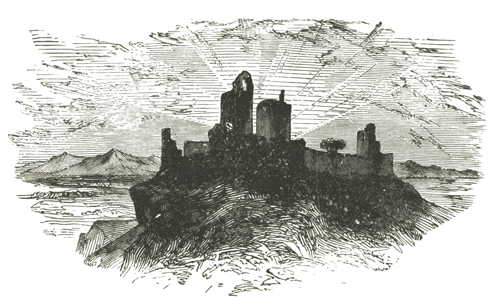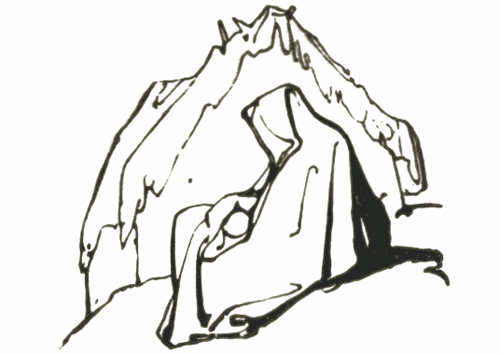The Rock of the Candle - Fairy Legends of Ireland

Rock of the Candle

FEW miles west of Limerick stands the once formidable castle of Carrigogunnel. Its riven tower and broken archway remain in mournful evidence of the sieges sustained by that city. Time, however, the great soother of all things, has destroyed the painful effect which the view of recent violence produces on the mind. The ivy creeps around the riven tower, concealing its injuries, and upholding it by a tough swathing of stalks; the archway is again united by the long-armed brier which grows across the rent; and the shattered buttresses are decorated with wild flowers, which gaily spring from their crevices and broken places.
Boldly situated on a rock, the ruined walls of Carrigogunnel now form only a romantic feature in the peaceful landscape. Beneath them, on one side, lies the flat marshy ground called Corkass Land, which borders the noble river Shannon; on the other side is seen the neat parish church of Kilkeedy, with its glebe-house and surrounding improvements; and at a short distance appear the irregular mud cabins of the little village of Ballybrown, with the venerable trees of Tervoo.
On the rock of Carrigogunnel, before the castle was built, or Brian Boro born to build it, dwelt a hag named Grana, who made desolate the surrounding country. She was gigantic in size, and frightful in appearance. Her eyebrows grew into each other with a grim curve, and beneath their matted bristles, deeply sunk in her head, two small grey eyes darted forth baneful looks of evil. From her deeply wrinkled forehead issued forth a hooked beak, dividing two shrivelled cheeks. Her skinny lips curled with a cruel and malignant expression, and her prominent chin was studded with bunches of grizzly hair.
Death was her sport. Like the angler with his rod, the hag Grana would toil and watch, nor think it labour, so that the death of a victim rewarded her vigils. Every evening did she light an enchanted candle upon the rock, and whoever looked upon it died before the next morning's sun arose. Numberless were the victims over which Grana rejoiced; one after the other had seen the light, and their death was the consequence. Hence came the country around to be desolate, and Carrigo-gunnel, the Rock of the Candle, by its dreaded name.
These were fearful times to live in. But the Finnii of Erin were the avengers of the oppressed. Their fame had gone forth to distant shores, and their deeds were sung by a hundred bards. To them the name of danger was as an invitation to a rich banquet. The web of enchantment stopped their course as little as the swords of an enemy. Many a mother of a son—many a wife of a husband— many a sister of a brother—had the valour of the Finnian heroes bereft. Dismembered limbs quivered, and heads bounded on the ground, before their progress in battle. They rushed forward with the strength of the furious wind, tearing up the trees of the forest by their roots. Loud was their war-cry as the thunder, raging was their impetuosity above that of the common men, and fierce was their anger as the stormy waves of the ocean!
It was the mighty Finn himself who lifted up his voice, and commanded the fata) candle of the hag Grana to be extinguished. "Thine, Regan, be the task," he said, and to him he gave a cap thrice-charmed by the magician Luno of Lochlin.
With the star of the same evening the candle of death burned on the rock, and Regan stood beneath it. Had he beheld the slightest glimmer of its blaze, he, too, would have perished, and the hag Grana, with the morning's dawn, rejoiced over his corse. When Regan looked toward the light, the charmed cap fell over his eyes and prevented his seeing. The rock was steep, but he climbed up its craggy side with such caution and dexterity that, before the hag was aware, the warrior, with averted head, had seized the candle, and flung it with prodigious force into the river Shannon, the hissing waters of which quenched its light for ever!
Then flew the charmed cap from the eyes of Regan, and he beheld the enraged hag, with outstretched arms, prepared to seize and whirl him after her candle. Regan instantly bounded westward from the rock just two miles, with a wild and wondrous spring. Grana looked for a moment at the leap, and then tearing up a huge fragment of the rock, flung it after Regan with such tremendous force that her crooked hands trembled and her broad chest heaved with heavy puffs, like a smith's labouring bellows, from the exertion.
The ponderous stone fell harmless to the ground, for the leap of Regan far exceeded the strength of the furious hag. In triumph he returned to Finn;
"The hero, valiant, renowned, and learned;
White-tooth'd, graceful, magnanimous, and active."
The hag Grana was never heard of more; but the stone remains, and deeply imprinted in it is still to be seen the mark of the hag's fingers. That stone is far taller than the tallest man, and the power of forty men would fail to move it from the spot where it fell.
The grass may wither around it, the spade and plough destroy dull heaps of earth, the walls of castles fall and perish, but the fame of the Finnii of Erin endures with the rocks themselves, and Clough-a-Regaun is a monument fitting to preserve the memory of the deed.

